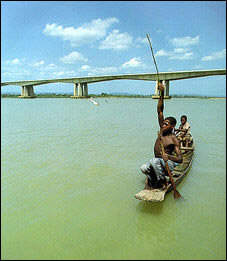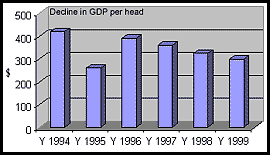 Getting on the right track for sustainable stability Getting on the right track for sustainable stability

As a result of the military regime, the Nigerian economy which witnessed phenomenal growth in the 1970s due to increased oil earnings suffered decline and stagnation in the 1980s and the 1990s. The UN Human development report has placed the country among the 25 poorest nations, with a per capita of 300 dollars. The report says only 40 per cent of the country's 120 million population have access to electricity, less than 20 per cent to potable water while telephone distribution is less than five per 1,000 people.
The Nigerian government in 1984 put the cost of its investments in economic sector projects at over US$ 30 billion. The projects contributed to Nigeria's external debts but yielded negative financial returns. In the 1999 budget, the outgoing military government reported that 43 projects financed with the equivalent of US$ 4.4 billion were classified as distressed in a 1996 nationwide appraisal of projects. Between January 1999 and May 1999, the budget 1999 was entirely spent.
The critical issue of debt relief
As a result of those contracts awarded and executed under dubious circumstances, Nigeria's debt accumulated over years is now seen by the Nigerian Government as a major impediment to the country's economic development plan. The Nigerian Government owes about US$ 20 billion to the Paris Club of creditors and US$ 6.5 billion to multilateral institutions. President Olusegun Obasanjo said last February, during a visit to France, that the debt issue "needs a new radical approach" to be able to keep up with the growing level of competition among developing countries. | Addressing to the French Government, Obasanjo said "in 1980, we borrowed up to $3.5 billion from the Paris Club countries. By 1985, with some defaults, the outstanding indebtedness, without any addition borrowing, had risen to $5.8 billion. By 1998, it was $20.9 billion. It is now claimed that the amount $31 billion".
At the Commonwealth-Nigeria Investment Conference held in Abuja in February 2000, Obasanjo's Chief Adviser Chief Philip Asiodu insisted on the fact that the country spent about $10 billion on peace-keeping efforts in Liberia and Sierra Leone.
Within this context, the French Parliament admitted in February that Obasanjo's administration was not responsible for the accrued debts, and therefore decided to partly write it off. This step forward is seen by the French Parliament "as part of our effort to protect democracy in Nigeria".

Income per head has maintained a general decline over the past six years. This follows the marginal growth in gross domestic product against a steady growth in population. This means that an average Nigerian has been having less and less to spend since 1996.
Creating jobs and raising purchasing power is part of what Nigerians associate with the "democracy dividend" that Obasanjo makes frequent reference to. In his foreign tours, the president defines democracy dividend more in terms of debt reduction and increased inflow of foreign investment. President Obasanjo is striving to please both domestic and foreign stakeholders in the Nigerian economy.
He is waging a sustained crusade to sanitize the running of government institutions with the hope of eradicating corruption. |

